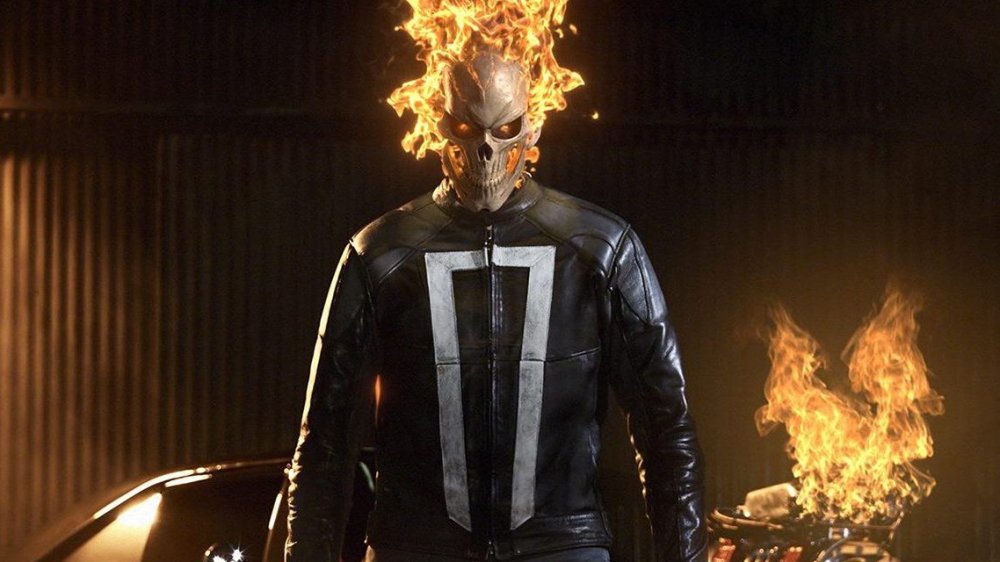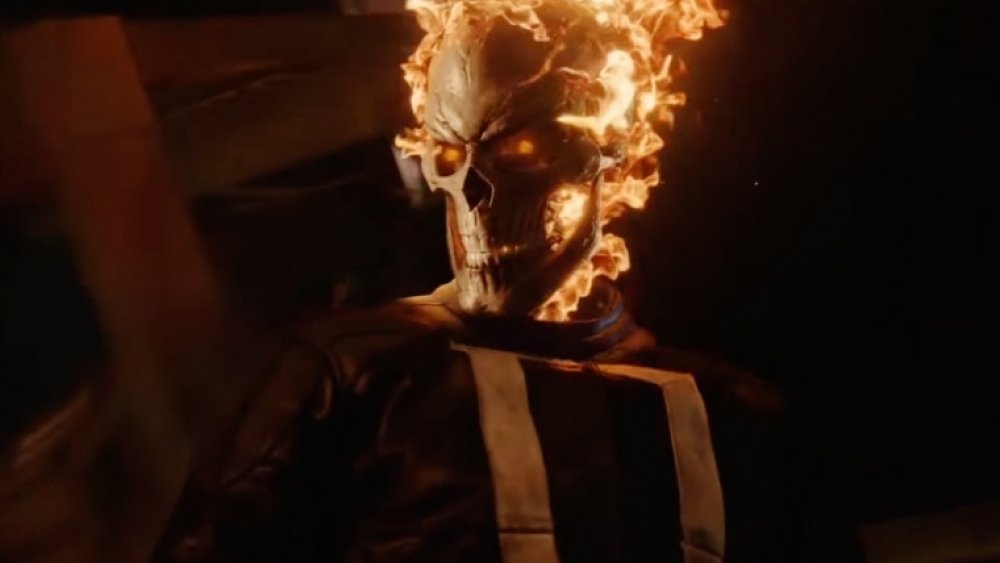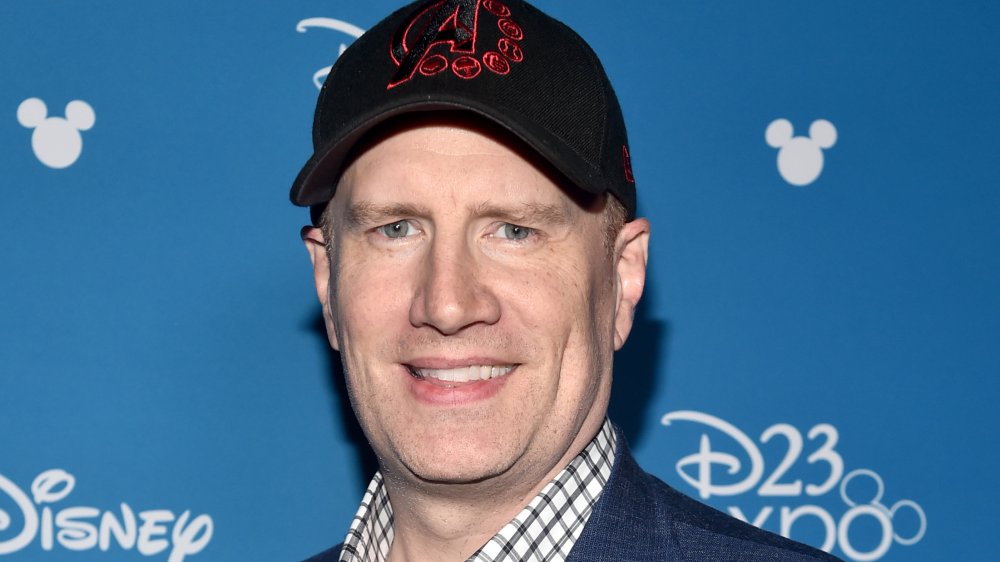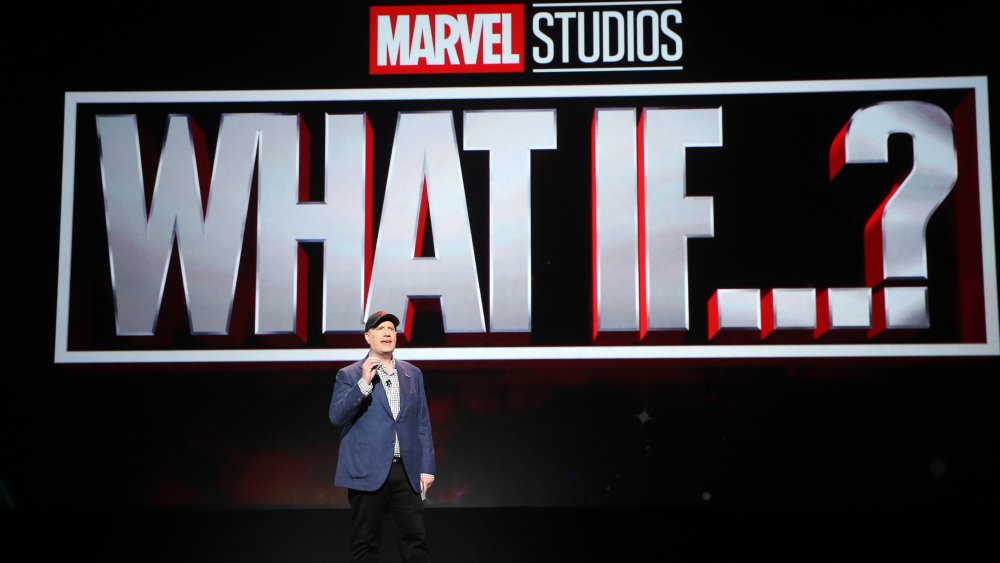Marvel Reportedly 'Shocked And Embarrassed' Over Ghost Rider Cancellation
Kevin Feige, the main architect behind the Marvel Cinematic Universe, was recently promoted to oversee everything Marvel-related for parent company Disney — not just his traditional territory of Marvel Studios. And that promotion means that Feige is wresting full control of the television side of Marvel from the company's CEO Ike Perlmutter and Head of Television Jeph Loeb — whose departure from the company has just recently been reported — as new reports indicate that Marvel hasn't been pleased over recent TV developments.
Specifically, Marvel Television executives were reportedly "shocked and embarrassed" that Hulu decided to cancel the planned live-action Ghost Rider series before a single episode had aired (via Variety). The streaming platform cut the cord on Ghost Rider in September 2019, just a few months after it was announced in May 2019 that the project was in development.
Why Hulu cancelled the Ghost Rider TV series
Ghost Rider was meant to be an off-shoot of the long-running ABC show Agents of S.H.I.E.L.D., arguably the most successful live-action Marvel TV series to date, but wouldn't actually have any ties to that series' storyline. The only connection it would have to Agents of S.H.I.E.L.D. was through Gabriel Luna, who was set to star on Ghost Rider as the titular flaming-skull-headed hero, which the actor had previously portrayed during a number of guest appearances on Agents of S.H.I.E.L.D.
So what happened? Why would Hulu kill a series that seemingly had everything going for it?
The truth is that companies can decide to cancel television series for any number of reasons. Low viewership, negative audience reception, behind-the-scenes troubles, a change in showrunner that leads to unforeseen negative consequences, the departure of a main actor that leaves the series struggling — we've seen it all. However, those are all possible explanations for why an already-released TV series might get the axe. It's a little different with shows that never make it off the ground — like Ghost Rider.
The reason why Hulu cancelled Ghost Rider was because of creative differences, the nature of which remains ambiguous to this day.
According to Deadline, Hulu and the creative team behind Ghost Rider hit "a creative impasse which could not be resolved." Since coming to an agreement was apparently impossible and the differences between the streamer and the show's team were evidently irreconcilable, Hulu executives decided not to move forward with the series.
That happened in late September 2019, and a month later, it's still unclear what exactly the creative roadblock entailed. Our best guess is that Hulu bosses and the Ghost Rider crew may have fought over the characterization of the main character, the man named Robbie Reyes who is bound to a demon and consumed by a cowl of fire. The intention was to totally revamp Ghost Rider for the Marvel-Hulu series, and have him stand as a "completely new iteration of the character" separate from the Agents of S.H.I.E.L.D. narrative. There's been no official confirmation of this, but it doesn't seem out of the realm of possibility to speculate that perhaps Hulu executives grew unhappy with how the Ghost Rider team planned to portray the titular antihero.
It seems the failure of Ghost Rider that was reportedly so shocking and embarrassing to Marvel TV bosses should have been the writing on the wall for the team that big changes were on the way, and now those changes have arrived. But what does this all mean for the future of Marvel Television?
Kevin Feige takes control
If you've noticed that Marvel movies have become more diverse and taken bigger risks over the last few years, that's no coincidence. Prior to 2015, Feige and Perlmutter shared control over Marvel Studios, meaning both executives had say over what ultimately ended up on the screen. The problem with that set-up was that the two rarely agreed on anything, and in 2015, Disney head Bob Iger made the decision to effectively split Marvel in half. The movie side of the business, Marvel Studios, would be handled by Feige, with zero input from Perlmutter. Likewise, Perlmutter maintained control of the comic book and TV businesses, without input from Feige.
One event that drove the split was apparently Perlmutter's steadfast refusal to allow Feige to pursue films with female and non-white leads. After Feige gained full control, one of the first things he did was put Black Panther and Captain Marvel into production — and the two films both made over $1 billion at the box office and now rank as the two highest-grossing solo franchise-starters in the MCU.
The TV side of the business, however, has not had the same kind of success as the MCU. While Marvel's movies are now the highest-grossing franchise of all time — by a long shot — Marvel TV has failed to make much of an impact. Inhumans was a critical and commercial disaster, Agents of S.H.I.E.L.D. was on the cancelation bubble every year (despite its success), and poor Ghost Rider was axed before it even began. Even Netflix's Marvel series were unable to escape the shadow of the MCU, with each and every one getting cancelled at the streamer in a string of show killings that took place from late 2018 to early 2019.
The future of Marvel TV
With Feige running the show(s), and with series like Ghost Rider no longer in the hopper, what will the future of Marvel TV look like? Odds are, it's going to look an awful lot like the MCU.
Even before Feige inherited the TV side of things, he was already spearheading Marvel Studio's invasion of the medium via a number of upcoming Disney+ series. The Falcon and the Winter Soldier, WandaVision, Loki, Hawkeye, and the animated What If...? are all set to debut on the new Disney streaming service over the next three years — with Moon Knight, Ms. Marvel, and She-Hulk to follow.
But other networks also have Marvel TV series — namely ABC, Freeform, and Hulu. So what will become of them?
Well, Agents of S.H.I.E.L.D. is ending on ABC of its own accord in 2020. Hulu's The Runaways was renewed for a third season prior to the Marvel TV shakeup, while a third season for Freeform's Cloak & Dagger has yet to be announced. There's also a slew of leftover Loeb projects in development at Hulu, including five animated series and the live-action Helstrom, but it's unclear if Feige will keep them around.
One defect that has plagued all of Marvel's previous TV efforts was the tenuous connection to the MCU. Though most of the series were meant to exist in the same universe as Feige's films, they never felt like it. But with Feige now running Marvel TV, too, you can bet that will change.



